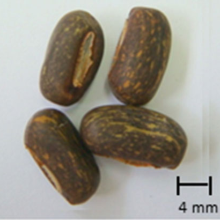Erythrina speciosa Andrews (Fabaceae) is a native tree of Atlantic forest from Southern and Southeastern Brazil. Although this species is found in flooded areas, it produces highly desiccation tolerant seeds. Here, we investigated the physiological and metabolic events occurring during seed maturation of E. speciosa aiming to better understand of its desiccation tolerance acquisition. Seeds were separated into six stages of maturation by the pigmentation of the seed coat. Water potential (WP) and water content (WC) decreased gradually from the first stage to the last stage of maturation (VI), in which seeds reached the highest accumulation of dry mass and seed coat acquired water impermeability. At stage III (71% WC), although seeds were intolerant to desiccation, they were able to germinate (about 15%). Desiccation tolerance was first observed at stage IV (67% WC), in which 40% of seeds were tolerant. At stage V (24% WC), all seeds were tolerant to desiccation and at stage VI all seeds germinated. Increased deposition of the arabinose-containing polysaccharides, which are known as cell wall plasticizers polymers, was observed up to stage IV of seed maturation. Raffinose and stachyose gradually increased in axes and cotyledons with greater increment in the fourth stage. Metabolic profile analysis showed that levels of sugars, organic, and amino acids decrease drastically in embryonic axes, in agreement with lower respiratory rates during maturation. Moreover, a non-aqueous fractionation revealed a change on the proportions of sugar accumulation among cytosol, plastid, and vacuoles between the active metabolism (stage I) and the dormant seeds (stage VI). The results indicate that the physiological maturity of the seeds of E. speciosa is reached at stage V and that the accumulation of raffinose can be a result of the change in the use of carbon, reducing metabolic activity during maturation. This work confirms that raffinose is involved in desiccation tolerance in seeds of E. speciosa, especially considering the different subcellular compartments and suggests even that the acquisition of desiccation tolerance in this species occurs in stages prior to the major changes in WC.
| Kontakt | https://www.frontiersin.org/articles/10.3389/fpls.2019.01356/full?&utm_source=Email_to_authors_&utm_medium=Email&utm_content=T1_11.5e1_author&utm_campaign=Email_publication&field=&journalName=Frontiers_in_Plant_Science&id=475075 |
|---|


